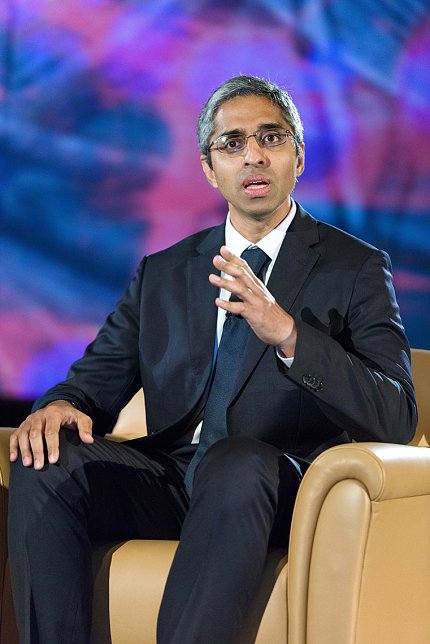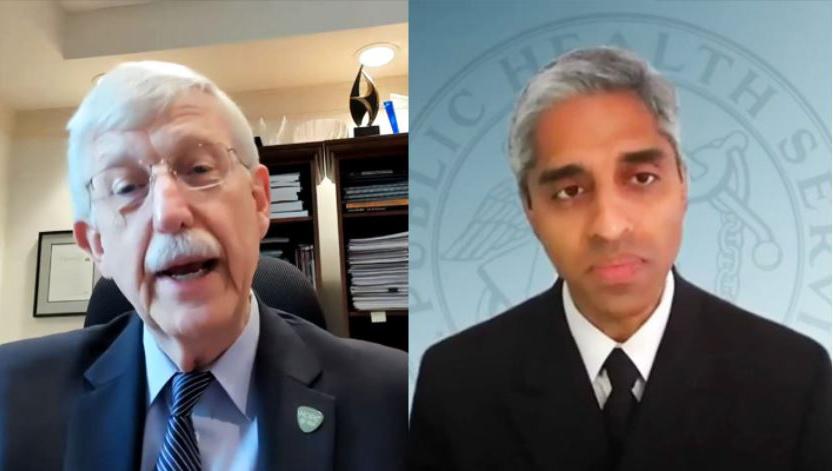Social Connections Key to Fighting Opioid Epidemic

Photo: Andrew Propp
The opioid epidemic was swept off the front pages as media focus shifted to the Covid-19 pandemic, said U.S. surgeon general Dr. Vivek Murthy.
“But the struggles have not disappeared,” he added during a virtual conversation with NIH director Dr. Francis Collins at the second annual HEAL Initiative investigator meeting. There were more than 92,700 overdose deaths between Nov. 2019 and Nov. 2020.
Loneliness and perceived social isolation challenge people struggling with addiction, including opioid use disorder. When he first became surgeon general in 2015, Murthy met people throughout the country struggling with loneliness and isolation and he commonly met patients with opioid use disorders who were alone.
Loneliness is a risk factor for mental and physical health conditions, opioid use disorder and addiction relapse, he said. It’s now found to increase the risk of anxiety, depression and cardiac disease.
“Addressing loneliness is an important public health issue if we care about addiction, mental health and the physical well-being of people,” he said.
The pandemic has been a particularly isolating time for adolescents and young adults. Even before the pandemic, many young adults reported high levels of anxiety and depression.
When it comes to loneliness, what matters most is the quality—not the quantity—of human connections, Murthy said.
“For many young people that I spoke to while traveling across the country, they would say that, ‘yes, we’re connected to people all the time. But we don’t necessarily feel like we can always be ourselves in our social media environment.’ That’s where comparison culture is at its height,” Murthy explained.
Social connections are important sources of resiliency. Many people instinctively reach out to family members or close friends during difficult times.
“If we want to build a society that’s healthier mentally and physically, that is more resilient and that is also more happy and fulfilled, then we have to think about how we build a society that is more centered around human connection and around relationships,” he said.
The pandemic has made it harder to get treatment for opioid use disorder. One silver lining from the health crisis has been telemedicine. It has the potential to improve and extend access to services for people living with opioid use disorders.
“I think the pandemic has accelerated our adoption of telemedicine by perhaps 5, 7 years,” he said. “We have to sustain that with not only the investment in broadband infrastructure but also with other tools so that people can use it everywhere,” such as health care reimbursement.

Even though it’s a medical condition, there’s still a stigma around addiction. People who feel judged for their disorders won’t feel comfortable seeking treatment, Murthy explained.
A few years ago, he met a couple who lost their son to an overdose. They told him that whenever they struggled, their friends dropped off food or visited them. When their son died, however, no one stopped by.
“We still have many people in the country who feel the shame of what they’re dealing with,” Murthy said. “We still have many family members who feel that this is a source of shame to have a loved one struggling with a substance use disorder.”
He called on society to think about strength differently. Strength isn’t being the most aggressive or loudest, he noted. Rather, strength is “displayed in moments of vulnerability when people have the courage to open up and be themselves,” and it’s “defined by the people who have the courage to display love, patience and compassion, especially when it’s difficult.”
People struggling with opioid use disorders need medication and assisted treatment, counseling and social and recovery services.
“But the engine that will drive our healing is fundamentally the love and compassion that come from human relationships,” Murthy concluded.
